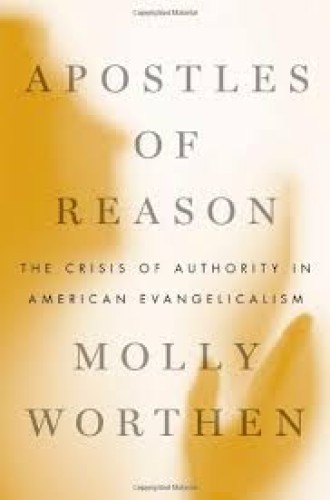Apostles of Reason, by Molly Worthen
In the spring of 1980 when I learned the improbable news that I had been accepted into a doctoral program, two people I much admired weighed in with their reactions. My adviser, for whom I had written a master’s thesis on biblical inerrancy, warned me darkly that the people at Princeton would “come after me” on the inerrancy question. I hoped that my father, an evangelical minister, might betray even a hint of pride that his eldest son had been admitted to study at an elite university. Instead, he became very quiet before expressing his fear that my intellectual pursuits would jettison my piety.
I offer that anecdote (at the considerable risk of being overly self-referential) because it illustrates the tensions at play in Molly Worthen’s remarkable and textured study Apostles of Reason: The Crisis of Authority in American Evangelicalism. And I compound my transgression by recalling the title of a tract in the narthex of my father’s church back in the 1960s: “Missing Heaven by Eighteen Inches,” the distance between one’s head and one’s heart.
Read our latest issue or browse back issues.
Worthen, a historian at the University of North Carolina, constructs a kind of genealogy of ideas in American evangelicalism from the postwar period to the present. One strain, generally identified with neoevangelicalism and the early years of Fuller Theological Seminary, was really a form of presuppositionalism derived from the work of Cornelius Van Til, longtime professor at Westminster Theological Seminary, who argued that believers should not shy away from their conviction that all knowledge is derived from God and scripture. Another strain, more indebted to the Wesleyan-Holiness tradition (and often mistaken as anti-intellectual), eschewed arid rationalism in favor of a robust piety. At the heart of evangelicals’ conflicted identity, Worthen argues, is the “struggle to reconcile reason with revelation, heart with head, and private piety with the public square.”
The saga of evangelical conflict, in Worthen’s telling, begins with biblical inerrancy. In identifying inerrancy as the touchstone of evangelical identity, evangelical scholars in the Reformed tradition sought to refight the intellectual battles they had lost in the previous century, but they also allied themselves with a rationalistic approach to faith that they combined with a “Christian world-and-life view.” Not all evangelicals signed on, but the inerrantists, especially through the agency of Christianity Today and various other institutions, used the doctrine as a foundation for their reemergence on the national scene. “The credo of the Christianity Today crowd,” Worthen writes, “was becoming evangelicalism’s predominant public theology.”
Some Wesleyans, Mennonites, Pentecostals, and fellow travelers sought to resist being sucked into the Reformed-inerrantist vortex. Mildred Bangs Wynkoop, a member of the Nazarenes, protested the “ground swell of ultra-rightism,” which she attributed to “Calvinistic evangelicalism.” The charismatic renewal and the move of some evangelicals toward more liturgical traditions further splintered a movement already known for its fissiparous tendencies.
But the neoevangelicals possessed institutional advantages. Most evangelicals by the 1970s were becoming enamored of education: the neoevangelicals tended to brandish better educational pedigrees, and most evangelicals had abandoned their reflexive disdain for the social sciences, especially when those methods could be harnessed in service to missions and church growth.
Worthen blames the eclipse of left-leaning evangelicals on their failure “to offer a grand narrative that could compete with the plotline emerging on the Right: an account of American history that began with pious Puritans and Bible-believing Founding Fathers, culminating on the Manichaean battlefield of the Cold War.” And the author attributes the emergence of the religious right to a “multidimensional panic over the Bible’s authority.”
This interpretation might sound a tad simplistic, but it is not implausible. Worthen asserts that evangelicals’ political conservatism is a reaction to the charismatic renewal’s “exaltation of a personal, ecstatic encounter with God,” which in turn “challenged the obsessive rationalism undergirding the doctrine of inerrancy.” The reassertion of a cramped literalism may explain the religious right’s opposition to women’s rights and gay rights (19th-century evangelicals found ways to maneuver around the former issue), but it hardly accounts for other elements in its agenda, such as militarism or the celebration of capitalism.
Worthen suggests that many evangelicals found the authority they were seeking in a phalanx of evangelical experts. None was more important or prominent than Francis Schaeffer, a pseudo-intellectual whom Worthen devastatingly characterizes as “a brilliant demagogue who offered up all of Western history in an hour’s lecture, stripped of confusing nuance.” Schaeffer’s brilliance lay in his media savvy and in his forging of history into a sword for the culture wars. “He deployed the trappings of academic investigation—litanies of historical names and dates; an accommodating version of Enlightenment reasoning—to quash inquiry rather than encourage it, to mobilize his audiences rather than provoke them to ask questions.” Schaeffer represented the culmination of the neoevangelical crusade to construct an intellectual movement around inerrancy and a “Christian” worldview; ironically, that culmination degenerated into anti-intellectualism.
Others, most of whom also hailed from the Reformed tradition, followed Schaeffer’s lead: Tim LaHaye, Rousas John Rushdoony, and a legion of young-earth creationists, all of whom trumpeted their fidelity to inerrancy. The conservative takeover of the Southern Baptist Convention in 1979 signaled not only a retreat from progressive evangelicalism but also an improbable redefinition as part of the Reformed tradition. Similarly, my own Evangelical Free Church had recast itself in the 1960s and 1970s from a holiness-pietist denomination that ordained women to an ostensibly Reformed denomination that forbade women’s ordination.
Unlike Schaeffer’s treatment of history, Worthen’s intellectual history of evangelicalism over the last seven or so decades is nuanced, and her arguments are compelling. It is a measure of the quality and the provocative nature of the book that I wish the author had pushed even further. She establishes, for instance, the correlation between Calvinism and cultural and political conservatism, but not causation. Is there something inherent in Reformed thinking that breeds conservatism, at least in the American context? The lineage is extensive: Charles Hodge and the Princetonians, J. Gresham Machen, Carl McIntire, Schaeffer, and countless others, including D. G. Hart, Machen’s biographer. What drives them—ineluctably, it seems—toward the hard right?
In part, Apostles of Reason is a call to recognize the internal diversity of evangelicalism, to look beyond the media dominance of the neoevangelical fixation with biblical inerrancy and a “Christian worldview” to find remnants of “the Anabaptist tradition of peace witness or Wesleyan ideas about Christ’s call for social justice.” The fact that the hyperrationalism of neoevangelicals devolved into popular anti-intellectualism is a paradox indeed, but it is no greater paradox than the invocation of Jesus to justify a right-wing agenda.
Perhaps a better word for the latter is tragedy, not paradox. Neoevangelicals preoccupied with the mind might have done well to consult another organ 18 inches distant.







